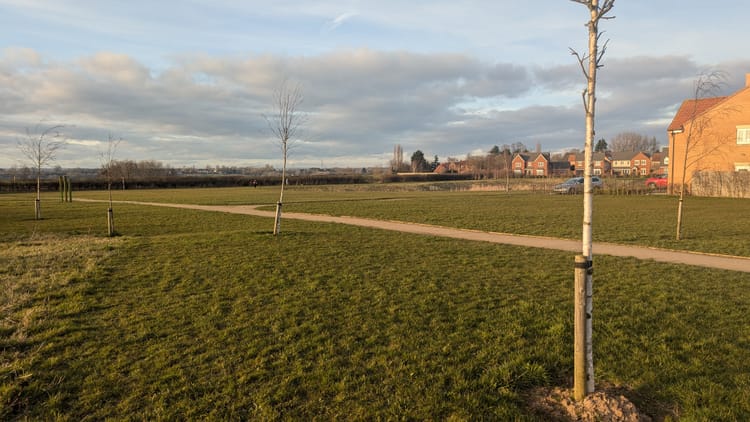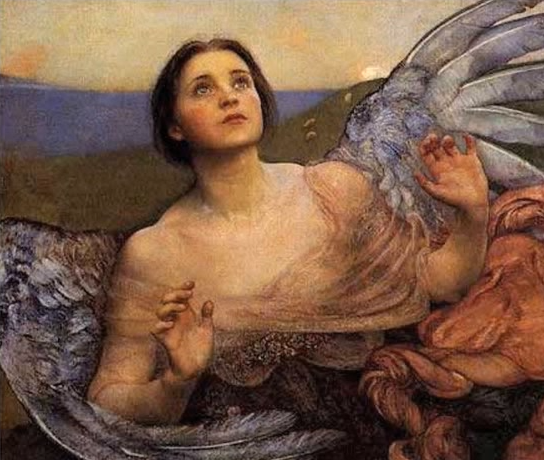All we like sheep
Although it's poor style to start with an 'incidentally'... It was odd when I googled the above phrase to discover (having sung it as part of the Messiah but somehow omitted to properly pay attention) that the sheep are not those who blindly follow, but those who dissent (in Isiah, they are those who wander or stray and who need a shepherd to bring them back to the correct path). It's interesting because the cultural meme of a sheep corresponds, surely, more to the religious devotee than to the atheist. I'd forgotten that the bible verse gives the sheep the opportunity to make its own path.
I'm writing briefly in a fast stream of consciousness to respond to a blog post I came across by a Twitter contact. In a similar stream of consciousness he had replied thoughtfully to a friend whose 12 year old daughter had been set an essay title for homework: "Why do Christians Believe in God?"
It was an interesting read for me, partly because it's clarified somewhat some aspects of the difference between people's attitudes which is often challenging to me. The whole post is suffused with a slight incredulity. The writer genuinely doesn't get why such a question would be asked - because he is coming from a faith-based position where even the mere fact of asking, is deeply odd. Here's how he puts it:
All I can do to help is share my own experience of being a Christian and what I know of God from that.
The writer goes on to explain how God is at the origin of humans, and not a thing we have created. He explains very beautifully why Christians might reach God (through Jesus), but articulates that the 'why' of faith is not a question that has meaning. He also explains that God is part of all of us. There is no chronology and no hierarchy - Christians don't believe 'because' anything; they just do, because it is simply the case, and simply self-evident in its very trueness.
For me, on the other hand, it seems increasingly clear that in many ways I'm a natural, cultural atheist. The question "Why do Christians believe in God" is just as natural a question to ask, to my mind, as, say, why do Jewish men wear a kippah; or why do Muslims have to pray five times a day in the direction of Mecca. Christianity, to me, is pretty much just a religion among others, that some people believe in. In terms of how true it is, it ranks exactly equal alongside the Vikings' belief in Odin and Valhalla, or the Greek gods and their adventures on Mount Olympus.
That's not to say that I have the same personal relationships with all these faiths. Indeed, I have a lot of personal fondness for Christianity and Anglicanism in particular - I particularly value the trappings of western European expressions of Christian faith as being part of my own cultural heritage as a member of a western European society. I grew up singing hymns at school and I particularly chose to study Christian iconography at university. I've also actively chosen to sing religious music in choirs I have joined. I find the emotions expressed in religious art and music, often, to be powerfully articulated and universally relevant to the human condition and what it means to be human. When I feel moved by religious art I consider that I am moved by the poetry of the story just as I might be moved by any well-written work of fiction, and I've never clashed with people of faith about these sorts of ideas (although I'm quite happy to talk openly about being an atheist).
Of course, the question asked to the 12 year old is not just a question of why certain religions believe that they must perform certain rites or practices. What's challenging about it is that it asks directly - why do people have faith in an unprovable entity? Why do people believe in a divine force at all? What is faith? It's not a question that the writer feels inclined to answer, and the way he articulates this is that, quite simply, it is not a meaningful question to him. God just is.
The only part of his post that, if I'm frank, I have difficulty respecting, is where he takes issue with the media, and humanism, and the RE curriculum. He's clearly critical of all three, and by implication feels that schools and the media are wrong to teach us to question and prove and reason.
(I must briefly comment on the RE curriculum. It is only schools which are explicitly faith schools and which are Voluntary Aided, which are allowed to proselytise within their curriculum. Schools run by the Local Education Authority - Community or Voluntary Controlled schools - may even be 'faith' schools such as C of E but are not allowed to attempt to convert children to a particular faith. I think that it's extremely important to encourage children to think for themselves and to decide for themselves, and I'm sure the blog writer would agree that if people are to find a particular faith they should do so on their own. Personally, I don't object to the cultural trappings of a C of E school but I would object to my children being proselytised to.)
Of course people are not going to come to God through questioning, and reasoning, and looking for proof. The writer agrees; but for a different reason. He thinks that faith has to come from faith alone because that is the nature of faith. Atheists would say that people will never reach God through reason, because God does not exist.
His post has, at least, clarified things in my mind - I understand a little more why atheists and those of faith can have such difficulty communicating with each other.
I think it is a wonderful question for a twelve year old. Whether the girl has been brought up in faith or not, it's a great question to start off her growing-up wonderings about why people are how they are and why people are different from each other.
Why do Christians believe in God? Personally, I think it's because it answers something psychological within us. But I'm not going to say a need, because I feel no need whatsoever to believe in God. I do think that some people feel that it's a safety net or a protection, or quite simply, a little bit of company (God will help me - God is watching me and if I pray, God will take care of me) but I don't think atheists lack something in life, for not having that. I think we find strength and help in other things - there isn't a void, by any means.
However, I do feel a need for art, literature and music. And it's probably a similar impulse. It gives humans something to rise above the mundane - because as beings, we can. We're amazing, and we should appreciate what amazing minds we are lucky enough to be able to experience, that we can consider deep questions about the nature of existence and the nature of our own experiences, emotions and interactions, and we can articulate those feelings in profound and beautiful ways. That's why I am happy to call Christians my friends, because in many important ways, they are simply doing the same thing that I'm doing, but in a different way.
Post-script: After articulating these lovely things I'm tempted to add one more thought. I've been writing this piece with one of Derren Brown's live shows on in the background. Derren Brown is one of the UK's most publicly outspoken atheists. And it strikes me that it's very human to love wonder and magic, and to seek out magic. If Derren Brown deliberately hides his methods (or couches them in psychological jargon which I personally believe is just another layer of smokescreen for what is mostly traditional sleight of hand or plain lying) then it's because he knows that we love mystery, magic and wonder, and that's another thing that makes us human. I think Derren Brown loves what he does because he loves human nature; he loves the human love of mystery, magic and wonder, and being able to tread that line and play people on the very edge of it. Being human is a funny thing.





Member discussion